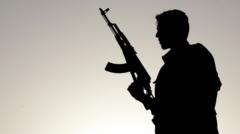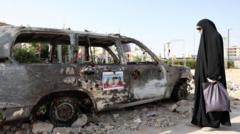The families of Kurdish fighters in the Kurdistan Workers' Party (PKK) are grappling with mixed emotions following the group's recent decision to cease its long-standing insurgency against Turkey. Pressing concerns over the fate of their loved ones in the stark Qandil Mountains reflect broader tensions in the region, as some families anticipate reunification while others harbor resentment toward the PKK for "brainwashing" their young members.
Families of PKK Fighters Hope for Reunification Amidst Ongoing Conflict Dynamics

Families of PKK Fighters Hope for Reunification Amidst Ongoing Conflict Dynamics
As the PKK transitions from 40 years of conflict with Turkey, families of fighters express hope and fear regarding their loved ones' futures.
Leila*, a mother residing in the semi-autonomous Kurdistan Region of Iraq, reflected poignantly on her son’s decision to join the PKK three years ago. The ex-sandwich seller, she recalls, was driven by the group's promises of defending Kurdish rights across borders in Turkey, Iraq, Syria, and Iran. Following the PKK's announcement last month to disband, Leila found herself hopeful for her son's return; however, as weeks pass without communication, her optimism wanes.
"At first, I was so happy when I heard the news," she remarked, concealing her identity out of fear of possible reprisal from the PKK. "But everything remains the same." The ongoing conflict, which has claimed over 40,000 lives in its 40-year history, predominantly among civilians, has embroiled families in complex emotions — with some expressing strong loyalty to the PKK for what they perceive as a struggle for Kurdish autonomy.
The PKK's recent announcement was perceived as a significant step towards peace by some, yet negotiations have yet to yield a formal ceasefire or peace process with Turkey, leaving the situation unresolved. With fighting continuing on both sides, there exists a palpable tension.
The BBC gained rare access to the Qandil Mountains, where the PKK operates, depicting a region marked by beauty which simultaneously shelters thousands of fighters from Turkish air strikes. However, attempts to engage with the PKK for further insights were thwarted, as they curtailed media presence amid ongoing dialogue with both Turkish and Iraqi officials regarding disarmament.
Zagros Hiwa, a spokesman for the PKK-affiliated Kurdistan Democratic Communities Union (KCK), stated that significant progress toward peace hinges on the release of imprisoned PKK leader Abdullah Ocalan and that unilateral steps cannot dictate the peace process. Meanwhile, a senior PKK commander expressed skepticism about disarmament, reflecting deep-seated doubts regarding Turkey's intentions.
The changing dynamics have led many families to reconsider their connection to the PKK, with some expressing pride in their loved one's sacrifices while grappling with profound loss. Rondek Takoor, whose brother Kawa was killed while fighting for the PKK, articulated the bittersweet nature of potential peace — honoring the sacrifices made while yearning for what could have been.
Questions remain unresolved regarding the PKK's fighters and whether they will be reintegrated into society without legal repercussions. Turkish media has indicated that fighters without substantial crimes may return without fear of prosecution, but clarity remains elusive regarding leadership figures potentially being exiled.
For many of the families, the overarching concerns of political negotiations and military re-alignments come secondary to the personal hopes for their loved ones' safe return. As Leila poignantly stated, "This city has brought me nothing but pain." For her, the complexities of the political sphere are dwarfed by a singular desire: to embrace her son once more.
*Name changed to protect identity.
"At first, I was so happy when I heard the news," she remarked, concealing her identity out of fear of possible reprisal from the PKK. "But everything remains the same." The ongoing conflict, which has claimed over 40,000 lives in its 40-year history, predominantly among civilians, has embroiled families in complex emotions — with some expressing strong loyalty to the PKK for what they perceive as a struggle for Kurdish autonomy.
The PKK's recent announcement was perceived as a significant step towards peace by some, yet negotiations have yet to yield a formal ceasefire or peace process with Turkey, leaving the situation unresolved. With fighting continuing on both sides, there exists a palpable tension.
The BBC gained rare access to the Qandil Mountains, where the PKK operates, depicting a region marked by beauty which simultaneously shelters thousands of fighters from Turkish air strikes. However, attempts to engage with the PKK for further insights were thwarted, as they curtailed media presence amid ongoing dialogue with both Turkish and Iraqi officials regarding disarmament.
Zagros Hiwa, a spokesman for the PKK-affiliated Kurdistan Democratic Communities Union (KCK), stated that significant progress toward peace hinges on the release of imprisoned PKK leader Abdullah Ocalan and that unilateral steps cannot dictate the peace process. Meanwhile, a senior PKK commander expressed skepticism about disarmament, reflecting deep-seated doubts regarding Turkey's intentions.
The changing dynamics have led many families to reconsider their connection to the PKK, with some expressing pride in their loved one's sacrifices while grappling with profound loss. Rondek Takoor, whose brother Kawa was killed while fighting for the PKK, articulated the bittersweet nature of potential peace — honoring the sacrifices made while yearning for what could have been.
Questions remain unresolved regarding the PKK's fighters and whether they will be reintegrated into society without legal repercussions. Turkish media has indicated that fighters without substantial crimes may return without fear of prosecution, but clarity remains elusive regarding leadership figures potentially being exiled.
For many of the families, the overarching concerns of political negotiations and military re-alignments come secondary to the personal hopes for their loved ones' safe return. As Leila poignantly stated, "This city has brought me nothing but pain." For her, the complexities of the political sphere are dwarfed by a singular desire: to embrace her son once more.
*Name changed to protect identity.






















